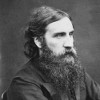“ Whatever esteem a man may have for any quality, abstractedly considered; when he is conscious he is not possest of it ”
David Hume, A Treatise of Human Nature (1738). copy citation
| Author | David Hume |
|---|---|
| Source | A Treatise of Human Nature |
| Topic | quality self-esteem |
| Date | 1738 |
| Language | English |
| Reference | |
| Note | |
| Weblink | http://www.gutenberg.org/files/4705/4705-h/4705-h.htm |
Context
“The praises of others never give us much pleasure, unless they concur with our own opinion, and extol us for those qualities, in which we chiefly excel. A mere soldier little values the character of eloquence: A gownman of courage: A bishop of humour: Or a merchant of learning. Whatever esteem a man may have for any quality, abstractedly considered; when he is conscious he is not possest of it; the opinions of the whole world will give him little pleasure in that particular, and that because they never will be able to draw his own opinion after them.
Nothing is more usual than for men of good families, but narrow circumstances, to leave their friends and country, and rather seek their livelihood by mean and mechanical employments among strangers, than among those, who are acquainted with their birth and education.”
source


